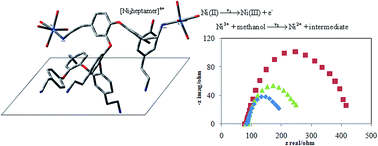Physioelectrochemical and DFT investigation of metal oxide/p-type conductive polymer nanoparticles as an efficient catalyst for the electrocatalytic oxidation of methanol
Abstract
In the present study, in order to achieve an inexpensive tolerable anode catalyst for direct electrooxidation of methanol, poly tyramine nanoparticles and NiO, identified by PTy–NiO, were prepared by in situ electropolymerization of tyramine in the presence of an anionic surfactant under ultrasonic irradiation. Ni(II) ions are incorporated into the electrode by immersion of the polymeric modified electrode containing amine groups in a Ni(II) ion solution and a PTy–NiO composite film is formed in the alkaline medium on the surface of the electrode. The surface morphology of the film is studied by surface microscopy techniques. The presence of nickel in the films is confirmed by energy dispersive spectroscopy (EDS) analysis. Molecular modeling calculations are carried out for polymer–Ni with density functional theory (DFT) using a 6-31G(d,p) basis set and Gaussian 03 program package. Furthermore, the experimental absorbance spectra of PTy–NiO are compared with the results obtained from Maxwell Garnett theory (MGT) and the value of energy Eg = 3.75 eV of the composite obtained. Modified graphite electrodes (G/PTy–NiO and G/PTy–SDS–NiO) are examined for their redox processes and electrocatalytic activities towards the oxidation of methanol in alkaline solutions. Compared with G/PTy–NiO, the G/PTy–SDS–NiO electrode shows a higher catalytic performance in the electrocatalytic oxidation of methanol. A kinetic model was developed and the kinetic parameters were calculated using the methanol concentration dependency of charge transfer resistance derived from the impedance studies.


 Please wait while we load your content...
Please wait while we load your content...